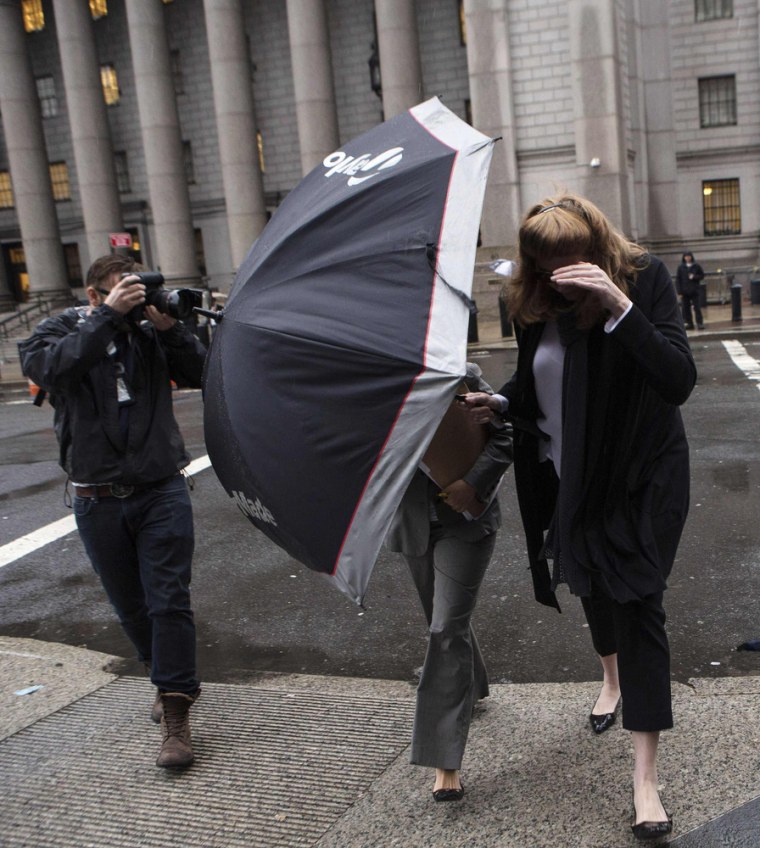A former Tiffany & Co executive will spend a year and a day in prison for stealing and re-selling more than $2.1 million of jewelry from the store's famed Fifth Avenue location in Manhattan.
Ingrid Lederhaas-Okun, 46, a former vice president of product development, delivered a tearful apology as she expressed to a federal judge her regret for the years-long theft from her longtime employer.
"I can't express my remorse enough," Lederhaas-Okun said.
Lederhaas-Okun, of Darien, Conn., pleaded guilty on July 26 to one count of transporting stolen property in interstate commerce, less than a month after being arrested.
Her lawyer had asked for a sentence of six months while the government sought at least three years. Prosecutors had pushed for Lederhaas-Okun to be sentenced for up to 46 months in prison for a crime that Tiffany in a court filing called "sad and disturbing."
U.S. District Judge Paul G. Gardephe said before handing down the sentence that it was impossible to know what set Lederhaas-Okun on a path of "self-destruction which could only have one outcome — disaster."
The judge said she deserved more than six months because of how long the thefts went on and the fact that she tried to resell some of the jewelry.
"This was not a crime of impulse," he said. "The defendant made many bad decisions over many years."
Gardephe also ordered Lederhaas-Okun to forfeit more than $2.11 million to the government and pay $2.24 million in restitution, an amount sought by Tiffany.
By her own lawyer's account, Lederhaas-Okun engaged in the first of many thefts in 2005, taking a pendant from Tiffany, where she worked since 1991.
In the years that followed, Lederhaas-Okun would steal jewelry and sell it, pocketing the money for herself, prosecutors say. The government says the jewelry included bracelets, earrings and pendants made of diamonds, platinum and gold.
Prosecutors say she was able to engage in the theft undetected for so long because Lederhaas-Okun's position enabled her to take jewelry from the store and write it off inventory.
Tiffany said it only came to suspect something was wrong after terminating Lederhaas-Okun as part of a mass layoff in February.
To conceal her theft, Lederhaas-Okun repeatedly lied to Tiffany, according to a news release from the U.S. Attorney's Office. After her termination, she told the jeweler that she had only recently checked out the missing jewelry in anticipation of creating a PowerPoint presentation for her supervisor, and that a draft of the presentation could be found on her office computer.
However, the missing jewelry had been checked out months earlier, her supervisor was unaware of any such presentation being worked on and there was no draft presentation on her computer.
In addition, Lederhaas-Okun claimed the jewelry in question could be found in a white envelope in her office. A search turned up no envelope — or jewelry.
At Monday's hearing, Gardephe said Lederhaas-Okun's motivation was "difficult to explain." Lederhaas-Okun earned $360,000 a year at Tiffany from 2010 to 2012 and she and her husband, who has since the arrest sought a divorce, reported income of $700,000 to $900,000 during those years, the judge said.
Their house was valued at $4.4 million, he added. It is now up for sale to satisfy the court forfeiture.
In a court filing last week, Lederhaas-Okun's lawyer, Sabrina Shroff, argued instead the thefts stemmed from a "desperate effort" to compensate for the pain and depression of other life failures in her marriage and at work.
"For reasons that can only be explained by a psychiatric illness, Ingrid took huge risks with her life and her freedom each time she stole," Shroff wrote. "The risk did not pay off."
— The Associated Press and Reuters contributed to this report.
